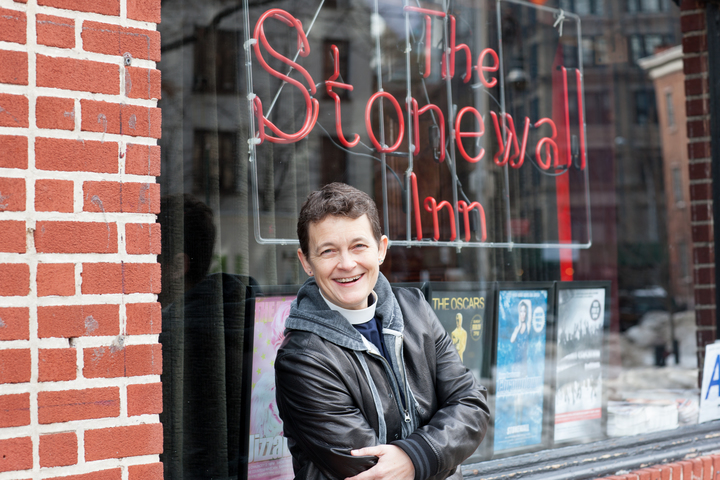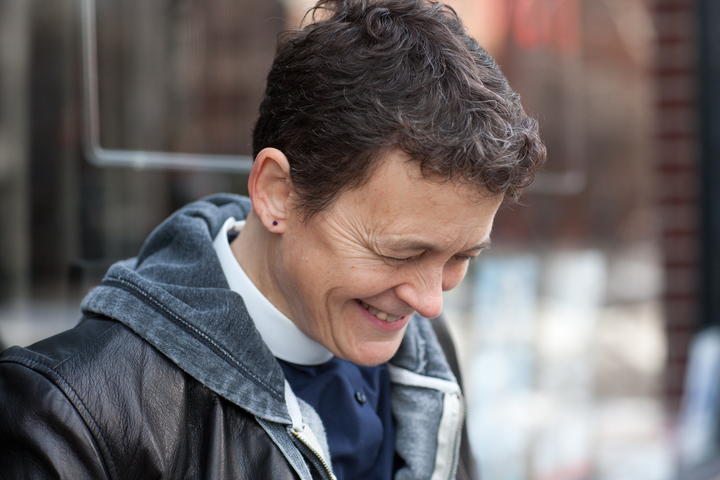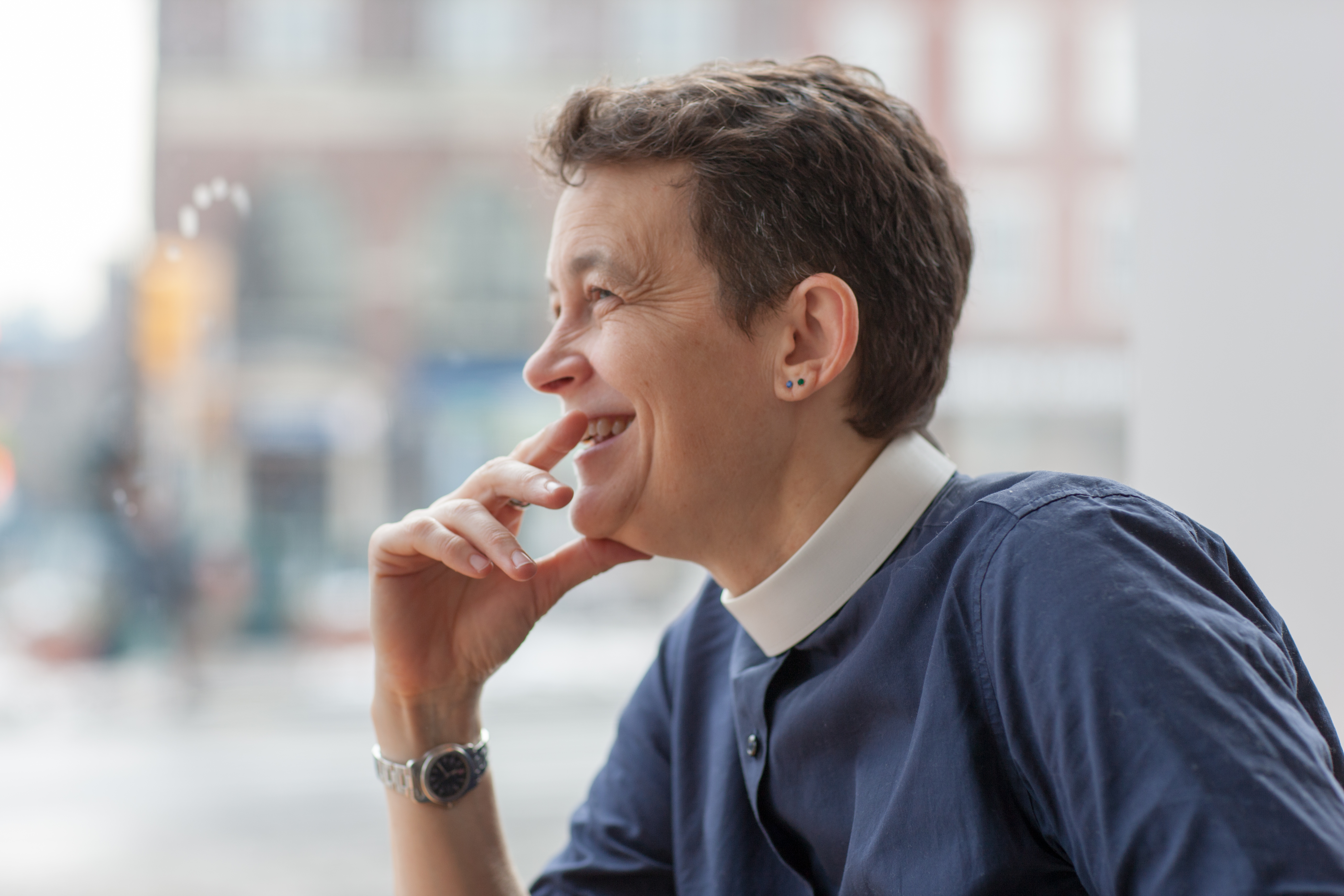By Mohammad Mia
In 2016, Rev. Elizabeth Edman published her book Queer Virtue: What LGBTQ People Know About Life and Love and How It Can Revitalize Christianity. In this interview, she describes the book’s guiding theology, and how it promises new life. Click here to buy a copy of the book today.
What experiences shaped your theology and led you to publish Queer Virtue?
Three experiences have shaped me: my identity as a queer person; my connection to the sacred, which is something I have felt my whole life; and my identity as a political animal, fascinated by questions of how we live together and the dynamics of power.
Landing at Union Theological Seminary in 1988, as churches were torn by questions of what to do with queer people, was formative. The Gay and Lesbian Caucus was doing important work in liberation theology. At Union I was expected to bring my whole self to bear as I grappled with questions of who we are, who is God, and how we are to understand one another. Queer Virtue is deeply rooted in the community I found at Union and the education I received here.

Can you recall when this political interest began to emerge?
I don’t know, it’s been there ever since I was a little kid. I worked my first political campaign, for George McGovern, in 1972, when I was 9. I love questions about how we live together; fundamentally that’s what Christian ethics is for me.
That question, how do we live together, seems to be at the heart of Queer Virtue.
One reason Queer Virtue came together was my experience in the political world. Working on LGBTQ justice, I realized appeals to religion were often the stumbling block in our movement towards justice. Years ago I organized a press conference of faith leaders for a civil union campaign. A reporter asked, “Where in scripture do you see the justification for this law?” The pastors were stopped cold, with no clear response beyond, “Love your neighbor.” That’s a problem. It’s a problem when people of faith cannot clearly articulate what their faith is and how it has brought them to understand the world. One of the reasons your Queer Faith project moved me is that there are so many voices saying clearly this is how queerness informs my faith, and this is what queerness demands of me as a person of faith and as a minister specifically.
How has your queer experience shaped how you understand being Christian?
Queerness is authoritative to me, a conceptual lens that models something important for Christian communities. A queer ethical path is identical to the path Christians are called to walk as they discern an identity as children of God, connect to other people, build community, and look to the margins to see who is still struggling and do something about that. The book spells out what this ethical path is, what it is based on, and how it relates to Christianity.

I’m sure you had an audience in mind when writing. What did you hope they would receive?
I wanted to write a book that valued queer experience, that spread a balm on the wounds of queer people grievously wounded by conservative proclamations and deeds. I wanted to give progressive Christians a way of thinking about issues concerning sexuality, to model digging into the tradition for a theology that could undergird how we think about issues of social justice.
The fundamental premise of queer virtue is that authentic Christianity is, and must be, queer in the sense of disrupting false binaries. I want queer folks and Christians to grapple with the implications of that statement, which is what I see in the Queer Faith project—queer folks with a relationship to the sacred articulating queerness as a lens for comprehending what the sacred is, what it demands of us. In this way they are saying, “This is how my queerness and my God are holding me accountable.”
I love what you say about engaging this complexity! It is liberating to hear people share how they understand what they embody, particularly as others deny this complexity.
You’ve said that so wonderfully, and this is the fundamental false binary I want the book to disrupt. I can’t count the number of times people have asked me, “How do you reconcile your sexuality and your faith?” The question leaves me speechless; it simply doesn’t make sense. I did a book event and a young man came up to me and said, “I’m Christian and I’m gay. I have always been told that these two parts of me are separate, even opposed to each other. Yet I’ve had this intuitive sense they aren’t. As you spoke, I felt these walls inside begin to dissolve, and it feels so right.” That was a wonderful moment.

How have you negotiated material risk, recognizing your context while remaining true to who you are?
Katt Schgrudo Santos, a friend I work with at the New York City Anti-Violence Project, taught me that it is a privileged idea to think safety is normal. The idea is based on the belief that safety means I have a level of material security, I’m able to defend myself, I have a certain amount of control over my life. It’s true for some people in this world, but it’s certainly not true for all, and I’ve known this since I was a child.
I grew up in Arkansas and knew from the time I was a small child in a female body that I wasn’t safe. As I discerned my queer identity, I knew I wasn’t safe. This is one of those ethical demands presented to me by my faith tradition and by my queerness: both demand that we find our security in something bigger than our individual circumstances — a truth that we carry around inside of us, a truth that connects us to other people. We are not supposed to find security by picking up a weapon. The entire canon of Judeo-Christian scripture comes back again and again to insist that our safety lies in our trust in God, period. I’ve known that to be true my entire life, and my family modeled it for me lots of ways. But I’ve always just known that to be true.
What do you say to young folks, particularly queer folks discerning their relationship to the sacred?
The first is that your particularities, and the demands they make of you, are precisely what is needed in this world. Whatever it is that makes you who you are, figure out what it has taught you and use those lessons to connect and help other people answer their own questions about their purpose in the world. Queer people have work to do not just on justice issues but on understanding our own queerness. The things that make you who you are are valuable, so learn about them, own them, and draw on them to do the work you’ve been called to do, because we need it.
The second thing I would say, specifically to folks discerning calls to ministry or an articulation of the sacred, is to dig into your tradition(s). There has been this impulse to move away from tradition in reaction to what has been toxic in certain iterations, yet I believe our spiritual health resides in our ability to dive into the tradition authentically and pull out the meaning, truth, and liberation that is there. So don’t move away but dig in, immerse yourself in the tradition and preach a better message out of that.
